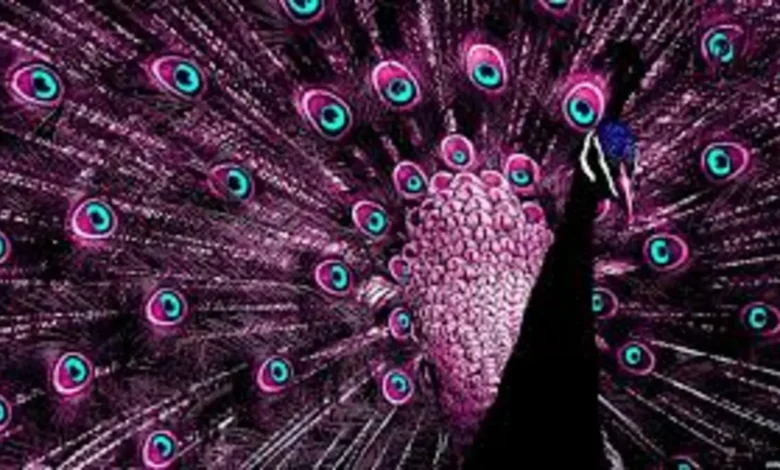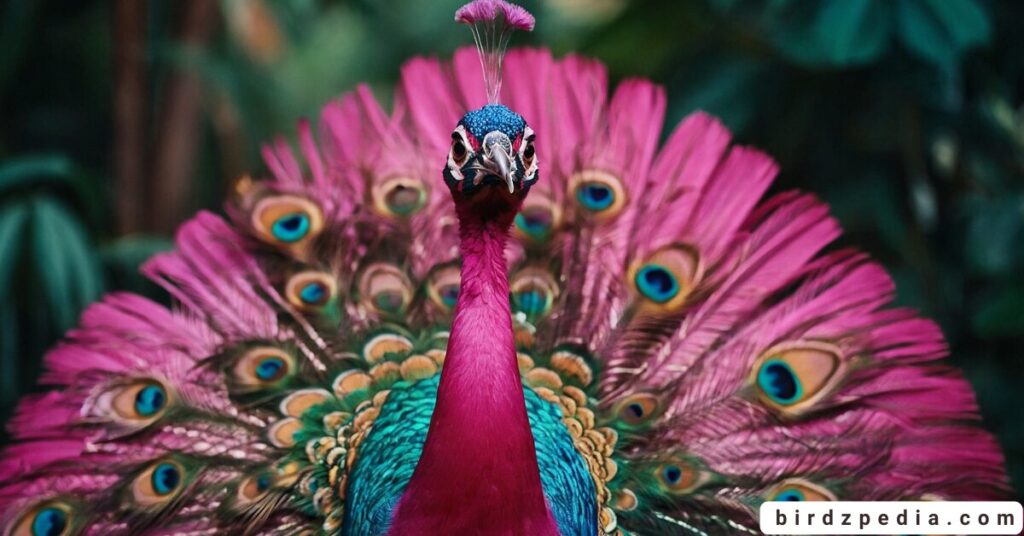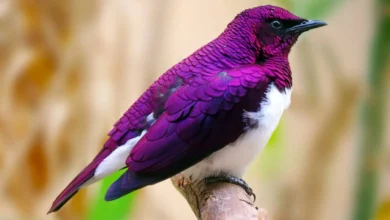The Alluring World of the Pink Peacock

Introduction: The Enigmatic Beauty of the Pink Peacock
The pink peacock, a rare and captivating variant of the traditional blue and green peafowl, has captured the imaginations of bird enthusiasts and nature lovers around the world. Its striking plumage, unique coloration, and graceful demeanor make it a symbol of beauty and elegance. In this article, we will delve into the fascinating world of the exploring its origins, characteristics, habitat, and significance in culture and art. Join us as we uncover the secrets of this enigmatic bird and discover why it continues to mesmerize people across the globe.
The Origin and Evolution of the Pink Peacock
Historical Background

The pink peacock‘s journey begins with the common peafowl, specifically the Indian Peafowl (Pavo cristatus), which is native to the Indian subcontinent. The peafowl has been a subject of admiration and reverence for centuries, often associated with royalty and opulence. The emergence of the pink peacock is believed to be a result of genetic mutations and selective breeding, aimed at enhancing its unique and vibrant coloration.
Genetic Mutations and Breeding
The pink hue in peafowl is a result of a rare genetic mutation that affects the pigmentation of their feathers. Unlike the common blue and green peafowl, the exhibits a pale, almost iridescent pink shade. This mutation can occur naturally, but breeders have also played a significant role in cultivating this rare color through selective breeding practices. By carefully selecting and mating birds with the desired traits, breeders have been able to enhance and propagate the pink coloration over generations.
Scientific Classification
Scientifically, the pink peacock belongs to the family Phasianidae, which includes other pheasants and partridges. Despite its unique coloration, the pink peacock is not considered a separate species but rather a color variant of the Indian Peafowl. Its scientific name remains Pavo cristatus, with the pink peacock being a rare and beautiful expression of this species’ genetic diversity.
Characteristics and Behavior of the Pink Peacock
Physical Appearance
The most striking feature of the pink peacock is undoubtedly its plumage. The bird’s feathers exhibit a delicate pink hue, with a subtle iridescence that shimmers in the light. This coloration is particularly prominent in the male peacock’s long, elaborate tail feathers, which he uses to display during courtship rituals. The female, or peahen, tends to have more subdued coloration but can still exhibit hints of pink in her feathers.
Behavior and Social Structure
Like their more common counterparts, pink peafowl are known for their elaborate courtship displays. The male’s extravagant tail feathers are fanned out to create a stunning visual spectacle, accompanied by a series of calls and movements designed to attract a mate. Pink peacocks are generally social birds, living in small groups called parties. These groups are usually composed of one dominant male and several females, along with their offspring.
Habitat and Distribution
Pink peafowl are primarily found in captivity, as their unique coloration makes them highly sought after by breeders and collectors. They can be found in aviaries, private collections, and zoos around the world. In the wild, their natural habitat would be similar to that of the Indian Peafowl, which includes deciduous forests, grasslands, and agricultural areas in the Indian subcontinent. However, due to their rarity and value, pink peafowl are seldom encountered in the wild.
The Cultural Significance of the Pink Peacock
Symbolism in Art and Literature
The pink peacock has found its way into various forms of art and literature, symbolizing beauty, grace, and rarity. In many cultures, peafowl are seen as a representation of immortality, renewal, and resurrection due to their ability to shed and regrow their magnificent feathers. The pink variant, with its ethereal coloration, often symbolizes purity and elegance. Artists and writers have drawn inspiration from the pink peacock, incorporating its image into paintings, sculptures, and stories that celebrate its unique beauty.
Role in Festivals and Traditions
In some cultures, the pink peacock plays a role in festivals and traditions, often being used as a decorative motif or a live display to enhance the visual appeal of celebrations. In India, where peafowl are native, these birds are a part of various cultural and religious ceremonies. Although the pink variant is rare, it still holds a place of honor in these traditions, representing luxury and splendor.
Influence on Fashion and Design
The striking appearance of the pink peacock has also influenced the world of fashion and design. Designers often draw inspiration from the bird’s unique coloration, incorporating shades of pink and iridescent elements into clothing, accessories, and interior decor. The elegance and sophistication associated with the pink peacock make it a popular motif in high-end fashion and luxury goods, where it symbolizes opulence and exclusivity.
Conservation and Ethical Considerations
Conservation Efforts
While the pink peacock is primarily found in captivity, conservation efforts are essential to ensure the genetic diversity and well-being of these birds. Breeders and aviculturists work to maintain healthy populations through responsible breeding practices, avoiding inbreeding and ensuring that the birds’ physical and genetic health is prioritized. Conservation organizations also play a role in raising awareness about the importance of preserving rare and unique color variants like the pink peacock.
Ethical Breeding Practices
The demand for pink peafowl has led to concerns about ethical breeding practices. It is crucial that breeders prioritize the health and well-being of the birds over profit. This includes providing proper care, nutrition, and living conditions for the peafowl, as well as avoiding breeding practices that could lead to genetic defects or health issues. Ethical breeders strive to balance the desire for rare and beautiful birds with the responsibility of ensuring their welfare.
Impact of Captivity on Pink Peafowl
Living in captivity can have both positive and negative impacts on pink peafowl. On one hand, it allows for the controlled breeding and preservation of this rare color variant. On the other hand, it can limit the birds’ natural behaviors and social interactions. Ensuring that captive pink peafowl have adequate space, enrichment, and social opportunities is essential for their physical and mental well-being. Aviaries and zoos that house these birds must strive to create environments that mimic their natural habitat as closely as possible.
The Role of Pink Peafowl in Modern Aviculture
Popularity Among Collectors
The pink peacock’s rarity and beauty have made it a coveted addition to private collections and aviaries. Collectors and aviculturists value these birds not only for their stunning appearance but also for their unique genetic traits. The allure of owning a pink peacock has driven demand, making them a prized possession in the world of exotic bird collecting. Enthusiasts often go to great lengths to acquire and care for these remarkable birds, contributing to their continued presence in aviculture.
Challenges in Breeding and Maintenance
Breeding pink peafowl presents several challenges, primarily due to the genetic complexities involved in producing and maintaining the pink coloration. Breeders must have a deep understanding of avian genetics and employ meticulous breeding strategies to ensure the health and viability of the offspring. Additionally, maintaining the delicate balance of genetic diversity is crucial to prevent issues related to inbreeding. Providing the appropriate care, diet, and environment for pink peafowl also requires specialized knowledge and resources.
The Future of Pink Peafowl in Aviculture
The future of pink peafowl in aviculture depends on continued efforts to promote ethical breeding practices and conservation. As interest in these birds grows, it is essential to prioritize their welfare and genetic health. Collaboration between breeders, aviculturists, and conservation organizations can help ensure that pink peafowl remain a vibrant and thriving part of aviculture. Public awareness and education about the importance of preserving rare color variants like the pink peacock can also contribute to their long-term sustainability.
The Pink Peacock in Mythology and Folklore
Legends and Myths
The pink peacock, like its more common counterparts, has found a place in various myths and legends around the world. In some cultures, peafowl are believed to be the earthly manifestation of mythical birds, symbolizing beauty and immortality. The pink peacock, with its otherworldly hue, is often seen as a magical creature, embodying purity and divine grace. Stories and folklore often feature pink peafowl as symbols of hope, renewal, and the extraordinary.
Spiritual Significance
In spiritual traditions, the pink peacock is sometimes associated with the divine feminine and the energies of love and compassion. Its delicate and rare coloration is thought to represent the higher vibrations of spiritual enlightenment and unconditional love. In meditation and visualization practices, the image of the pink peacock can be used to invoke feelings of peace, harmony, and inner beauty. The bird’s majestic appearance serves as a reminder of the spiritual beauty that exists within and around us.
Influence on Modern Spiritual Practices
Modern spiritual practitioners often incorporate the symbolism of the pink peacock into their practices. The bird’s image may be used in rituals, altar decorations, and visualizations to enhance the energy of love and beauty. Additionally, the pink peacock’s association with transformation and renewal makes it a powerful symbol in practices focused on personal growth and spiritual awakening. By connecting with the essence of the pink peacock, individuals can tap into its energy to inspire positive changes in their lives.



